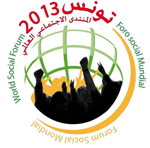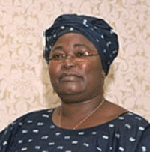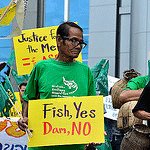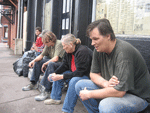Social Watch news
Published on Wed, 2013-03-27 15:21
Since joining the Euro in 1999, Portugal has had the lowest growth in the Eurozone. Between 2001 and 2007 Portugal experienced only 1.1% average annual growth. The government deficit was -6.5% of GDP in 2005 and it was -3.1% in 2007. When the global financial crisis occurred, a drop in tax revenues and the money allocation to support commercial banks, led to further increases in the government deficit and in general gross debt. At 108.1% in 2011, Portugal had the third highest general government gross debt to GDP ratio in Europe (EU27), behind only Greece and Italy (Eurostat, 2012a). As debt continued to grow investors were unwilling to lend and in May 2011 Portugal was the third country to seek a ‘bailout’ from the EU-ECB-IMF troika. The austerity measures accorded between the Portuguese Government and troika, are responsible for major setbacks. Many basic economic and social rights that were guaranteed are now being either questioned or neglected. In this scenario, the development cooperation public policy that contributed significantly to the achievement of the Millennium Development Goals (MDG) also suffered a major negative shift. The policy response to the 2008 financial crisis, was the implementation of a progressive stringent set of austerity measures: freezing of nearly all insurance benefits and pensions, reducing the pensions tax allowance, reduction in means-tested unemployment assistance, family benefit and social assistance, increase in standard VAT rate (from 20% to 23%) including increasing the VAT on natural gas and electricity to standard rate, increase in income tax rates and reductions of tax credits, public sector pay cuts (up to 10%), reductions in numbers of employees in central Government and across public administration generally. |
Published on Thu, 2013-03-21 12:18
Members of the Reflection Group, of which Social Watch is part, launched a draft Reflection Paper on Universal Sustainability Goals for a Post-2015 Agenda prepared as a contribution to the Civil Society Conference on the Post-2015 Agenda that started this week in Bonn. The paper pointed that the debates on an agenda for international co-operation and development beyond 2015 offer the opportunity to (re-)address in a holistic manner well-being and justice in societies. Given the economic, social and ecological challenges in the world, this is urgently needed. |
Published on Thu, 2013-03-21 12:11
Social Watch will organize -together with different partners- a number of meetings during the World Social Forum 2013 to be held March 26 -29 in Tunisia. These meetings will be an opportunity to review and reconsider new challenges of the Post 2015 framework and the challenges the Arab countries are going through after the Arab Spring. |
Published on Thu, 2013-03-21 11:53
Civil Society Organizations issued a statement that outlines the priorities and recommendations they have identified for the post-2015 development framework. These build on the new emerging challenges as well as the lessons learnt from the initial MDGs process’ failures and gaps. The CSO declaration was released during the Arab Regional Consultation on the post-2015 development agenda that was held on March 14, 2013, in Beirut, Lebanon. The meeting provided an opportunity to gather the views of civil society coalitions and key UN agencies the region. |
Published on Thu, 2013-03-21 11:11
Dr. Emily Sikazwe, former SW Coordinating Committee co-chair, was selected as exceptional women to celebrate International Women’s Day and also to launch VIDEA’s 35 profiles of exceptional women. |
Published on Thu, 2013-03-14 22:09
Malta, like all New Member States of the European Union, pledged to reach a level of official development assistance (ODA) of 0.17% of its gross national income (GNI) by 2010 and to increase it to 0.33% by 2015. Does Malta keep its promises to eradicate poverty in the world? Civil society organizations have expressed their concern given that the government spends a large amount of ODA funds in the detention of irregular immigrants, many of them asylum seekers, the vulnerability of most of which is recognized through their refugee status or other forms of protection. Although the improvement in the distribution of ODA should be noted, 88% of bilateral aid is not clear. This is the reason why the government has been most criticized by NGOs in Malta and abroad. |
Published on Thu, 2013-03-14 21:37
The approval of the 2010-2030 Energy Development Plan in Thailand will promote energy inequality among the population and the poorest will bear the heavy environmental costs of power plants, coal plants and even nuclear reactors, undermining the achievements of the MDGs that the country claims to have achieved by 2015. Academics, civil society organizations and local community organizations have expressed their opposition, proposed a new plan based on a holistic approach to energy planning and urged to shift from the strong dependency on fossil fuel to use energy more efficiently using sources of renewable energy. The latest Energy Development Plan (2010-2030), elaborated mainly by the Electricity Generating Authority of Thailand, is strongly influenced by the demands of the automotive and foundry industries, which will lead the national development plan for the next 20 years. |
Published on Mon, 2013-03-11 13:40
On International Women’s Day the global civil society network Social Watch emphasised the challenges facing women in different parts of the world. Three articles on the impact on women of policies being implemented in Canada, Egypt and Korea, are being published, all of them national contributions to the Social Watch Report for 2013. |
Published on Fri, 2013-03-08 00:03
Canada’s economic policy continues to take reduction of the debt and deficit as its primary end. The means to this end include cuts to social infrastructure spending, public sector employment and the health and welfare institutions that used to put Canada near the top of most international measures of well-being. Under cover of deficit reduction, the Government of Canada continues to withdraw funding from the civil society organizations and research institutions that measure the effectiveness of those government policies and provide alternatives to them. The impacts of those cuts are beginning to become evident as income inequality grows. On the international stage, Canada has championed austerity measures for countries facing economic crisis, Canadian foreign aid has been in decline while the Government's criticism of multi-lateral institutions for international cooperation increases. If market conditions were ever to close the gap in Canada, this would have been the time. Social assistance rates have remained virtually unchanged across most of Canada. Most social assistance incomes in Canada remain well below the low income cut-off rate. The overall poverty rate in Canada is 9%, however, poverty rates continue to disproportionately affect women, Aboriginal peoples, and people with disabilities. For example, one in three Aboriginal and racialized people in Canada live in poverty. One in four people with disabilities, immigrants, and female single-parents in Canada live in poverty. Across all categories rates of poverty are higher for women than for men. |
Published on Thu, 2013-03-07 23:15
Almost two years have passed since human rights and feminists organizations expressed their deep concern at the escalation of policies that reinforce impunity, do not protect citizens and do not guarantee the right of peaceful assembly. The exclusion of women from the public sphere through direct incitement and aggression must be condemned. The heinous crimes of sexual violence can not be separated from the decline of the social status of women. The revolution of January 25, as the Egyptians call it, is the fourth in the last hundred and thirty years. The modern national movement has sought an effective national sovereignty, particularly with regard to economy and the ability to ensure socio-economic justice in the distribution of wealth and income. The Egyptian people discovered that without internal democracy it is impossible to preserve the conquests from previous revolutions. January 25 revolution asserts, then, the centrality of democracy, not only as a utopian goal, which practical implementation would be deferred indefinitely, but to lay the foundations of a modern, independent and prosperous country. |
SUSCRIBE TO OUR NEWSLETTER












